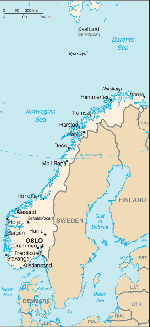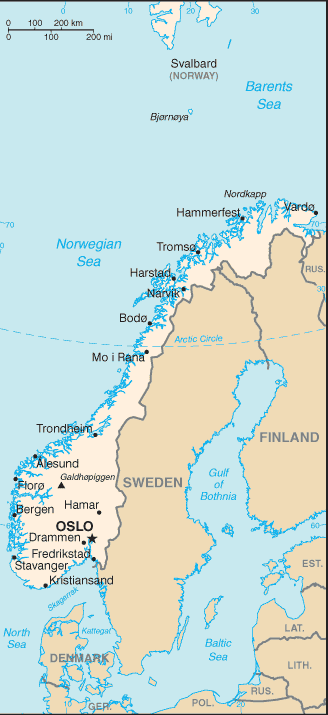|
On this page » |
|
July 06, 2009
COUNTRY DESCRIPTION: 
 Norway is a highly developed stable democracy with a modern economy. The cost of living in Norway is high and tourist
facilities are well developed and widely available. Read the Department of State Background Notes on Norway for additional information.
Norway is a highly developed stable democracy with a modern economy. The cost of living in Norway is high and tourist
facilities are well developed and widely available. Read the Department of State Background Notes on Norway for additional information.
REGISTRATION:U.S. citizens living or traveling in Norway are encouraged to register with the nearest U.S. embassy or consulate at the Department of State travel registration web page, so that they can obtain updated information on local travel and security. U.S. citizens without Internet access may register directly with the nearest U.S. embassy or consulate. Registration is important; it allows the State Department to assist U.S. citizens in an emergency.
ENTRY/EXIT REQUIREMENTS: Norway is a party to the Schengen agreement. As such, U.S. citizens may enter Norway for up to 90 days for tourist or business purposes without a visa. The passport should be valid for at least three months beyond the period of stay. For further details about travel into and within Schengen countries, please see our fact sheet.
For the most current visa information, contact the Royal Norwegian Embassy at 2720 34th Street, N.W., Washington, D.C. 20008-2714, Tel: 1-202-333-6000, or the nearest Norwegian Consulate. Consulates are located in Houston, Minneapolis, New York City, and San Francisco. Information can also be obtained from the Norwegian Directorate of Immigration website.
The U.S. Department of State is unaware of any HIV/AIDS entry restrictions for visitors to or foreign residents of Norway.
Information about dual nationality or the prevention of international child abduction can be found on our website. For further information about customs regulations, please read our Customs Information page.
THREATS TO SAFETY AND SECURITY:Norway remains largely free of terrorist incidents. However, like other countries in the Schengen area, Norway's open borders with its Western European neighbors allow the possibility of terrorist groups entering/exiting the country with anonymity. Americans are reminded to remain vigilant with regard to their personal security and to exercise caution.
For the latest security information, Americans traveling abroad should regularly monitor the Department of State’s Bureau of Consular Affairs website, which contains current Travel Warnings and Travel Alerts, as well as the Worldwide Caution.
Up-to-date information on safety and security can also be obtained by calling 1-888-407-4747 toll-free within the U.S. and
Canada or by calling a regular toll line, 1-202-501-4444, from other countries. These numbers are available from 8:00 a.m.
to 8:00 p.m. Eastern Time, Monday through Friday (except U.S. federal holidays).
The Department of State urges American citizens to take responsibility for their own personal security while traveling overseas. For general information about appropriate measures travelers can take to protect themselves in an overseas environment, see the Department of State’s extensive tips and advice on traveling safely abroad.
CRIME:Most crimes in Norway involve the theft of personal property. Residential burglaries, auto theft, and vandalism to parked cars also occur. Most high-end value vehicles, especially in Oslo, have visible alarm system indicators to discourage joy riders or thieves. Persons who appear affluent or disoriented may become targets of pick-pockets and purse-snatchers, especially during the peak tourist season (May-September). Thieves frequently target tourists in airports, train stations, and hotels, particularly lobby/reception and restaurant areas. Often such thieves work in pairs and use distraction as a method to steal purses or briefcases. While passports are frequently stolen in the course of these thefts, money, credit cards, and jewelry are the actual objects of interest. In some cases, stolen passports are recovered. Violent crime, although rare, occurs and appears to be increasing. Some thieves or burglars may have weapons.
In many countries around the world, counterfeit and pirated goods are widely available. Transactions involving such products may be illegal under local law. In addition, bringing them back to the United States may result in forfeitures and/or fines.
VICTIMS OF CRIME:If you are the victim of a crime abroad, you should contact the local police and the nearest U.S. embassy or consulate (see
end of this sheet or see the Department of State list of embassies and consulates). This includes the loss or theft of a U.S. passport. The embassy/consulate staff can, for example, assist you to find
appropriate medical care, to contact family members or friends and explain how funds may be transferred. Although the investigation
and prosecution of the crime is solely the responsibility of local authorities, consular officers can help you to understand
the local criminal justice process and to find an attorney, if needed.
Norway has a program to provide financial compensation to victims who suffer serious criminal injuries. Claimants can obtain
application forms from the Norwegian Criminal Injuries Compensation Authority. Please contact the U.S. Embassy in Oslo for further information. For further information about possible U.S. compensation, see our information for Victims of Crime
The national emergency telephone numbers in Norway, equivalent to the “911” emergency line, are: Police 112, Fire 110, and Ambulance 113.
CRIMINAL PENALTIES:While in a foreign country, a U.S. citizen is subject to that country's laws and regulations, which sometimes differ significantly from those in the United States and may not afford the protections available to the individual under U.S. law. Penalties for breaking the law can be more severe than in the United States for similar offenses. Persons violating Norway’s laws, even unknowingly, may be expelled, arrested or imprisoned. Penalties for possession, use, or trafficking in illegal drugs in Norway are strict and convicted offenders can expect long jail sentences and heavy fines. Engaging in sexual conduct with children or using or disseminating child pornography in a foreign country is a crime, prosecutable in the United States.
SPECIAL CIRCUMSTANCES:
Please see our information on customs regulations.
MEDICAI FACILITIES AND HEALTH INFORMATION: Medical facilities are widely available and of high quality, but may be limited outside the larger urban areas. The remote and sparse populations in northern Norway and the dependency on ferries to cross fjords of western Norway may affect transportation and ready access to medical facilities. The U.S. Embassy in Oslo maintains a list of emergency clinics in major cities.
Information on vaccinations and other health precautions, such as safe food and water precautions and insect bite protection, may be obtained from the Centers for Disease Control and Prevention’s (CDC) hotline for international travelers at 1-877-FYI-TRIP (1-877-394-8747) or via the CDC website. For information about outbreaks of infectious diseases abroad, consult the infectious diseases section of the World Health Organization (WHO) website. The WHO website also contains additional health information for travelers, including detailed country-specific health information.
MEDICAL INSURANCE:Healthcare in Norway is very expensive and healthcare providers sometimes require payment at time of service. The Department of State strongly urges Americans to consult with their medical insurance company prior to traveling abroad to confirm whether their policy applies overseas and whether it will cover emergency expenses such as a medical evacuation. Please see our medical insurance overseas page.
TRAFFIC SAFETY AND ROAD CONDITIONS:While in a foreign country, U.S. citizens may encounter road conditions that differ significantly from those in the United States. Public transportation in Norway is generally safe and the maintenance and condition of urban roads are generally good. Rural road conditions are fair and the availability of roadside assistance is limited. Most roadways beyond the city limits of Oslo and other major cities tend to be simple two-lane roads. In mountainous areas of Norway, the roads also tend to be narrow and winding, with many tunnels. The northerly latitude can cause road conditions to vary greatly, depending on weather and time of year. Many mountain roads are closed due to snow from late fall to late spring. The use of winter tires is mandatory on all motor vehicles from November to April.
Norwegian law requires that drivers always use their vehicle headlights when driving. Norwegian law also requires drivers to yield to vehicles coming from the right. In some, but not all, instances, major roads with “right of way” are marked. Seatbelts are mandatory for drivers and passengers.
Norway has some of the strictest laws in Europe concerning driving under the influence of alcohol; those laws prescribe heavy
penalties for drivers convicted of having even a low blood alcohol level. Frequent road checks with mandatory breathalyzer
tests and the promise of stiff jail sentences encourage alcohol-free driving. The maximum legal blood alcohol content level
for driving a car in Norway is .02 per cent.
Automatic cameras placed by the police along roadways help to maintain speed limits, which are often lower than in other European
countries. Fines – and sometimes even jail time – are imposed for violations.
Please refer to our Road Safety page for more information. For specific information concerning Norwegian driver's permits, vehicle inspection, road tax
and mandatory insurance, contact the Norwegian Tourist Board office at P.O. Box 4649, Grand Central Station, New York, New York 10163-4649 (Tel.: 212-885-9700; fax – 212/885-9710).
AVIATION SAFETY OVERSIGHT:The U.S. Federal Aviation Administration (FAA) has assessed the Government of Norway’s Civil Aviation Authority as being in
compliance with International Civil Aviation Organization (ICAO) aviation safety standards for oversight of Norway’s air carrier
operations. Further information may be found on the FAA's safety assessment page.
CHILDREN'S ISSUES:
Please see our Office of Children’s Issues web pages on intercountry adoption and international parental child abduction.
EMBASSY LOCATION/REGISTRATION: U.S. citizens living or traveling in Norway are encouraged to register with the nearest U.S. embassy or consulate at the Department of State travel registration web page, so that they can obtain updated information on local travel and security. U.S. citizens without Internet access may register
directly with the nearest U.S. embassy or consulate. Registration is important; it allows the State Department to assist
U.S. citizens in an emergency
Local embassy information is available below and at the Department of State list of embassies and consulates.
U.S.Embassy Oslo
Henrik Ibsensgate 48
Telephone: (47) 2244-8550 (24 hours)
Fax: (47) 2256-2751
***
This replaces the Country Specific Information for Norway dated November 10, 2008 without substantive changes.

 Norway
Norway